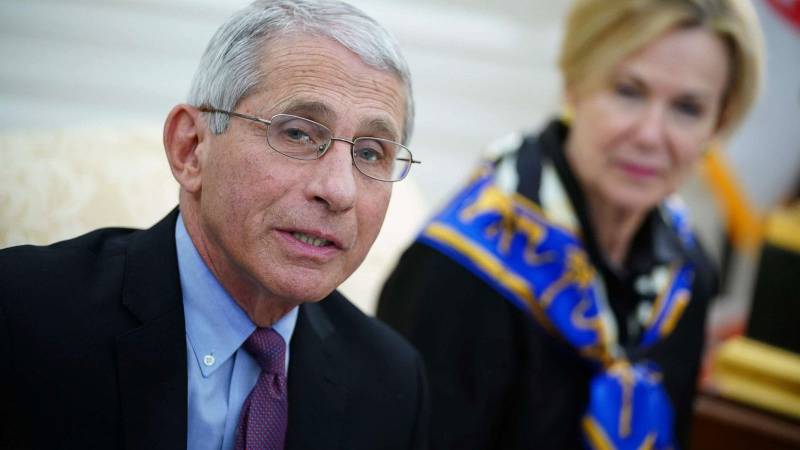
As the recovery of COVID-19 patients exposed to antiviral drug remdesivir was found to be 31% greater as opposed to from a placebo, the FDA is collaborating with Gilead to make remdesivir available for emergency use for those in dire need, said Fauci as per Reuters. T
The test results are “highly significant”, added White House Coronavirus Task Force Chief Anthony Fauci, the NBC reported. The remdesivir findings “open the door to the fact that we now have the capability of treating” COVID-19, and as more investigators and companies get involved, “it’s going to get better and better,” Fauci said.
He shared the findings while addressing a White House media briefing, and expressed hope that “this will be the standard of care.” Reiterating the above results, among more than 1,000 COVID-19 infected patients around the globe, remdesivir exposure had a median recovery time of 11 days, preliminary figures highlighted. This is in contrast to a median recovery time of 15 days for patients receiving a placebo.
Meanwhile, other results have not been statistically significant, and “suggest a survival benefit”. The group receiving remdesivir had a mortality rate of 8.0 percent versus 11.6 percent for the placebo group, quoted the NIAID. The NIAID study is the most rigorous to date, “the first truly high-powered, randomized, placebo-controlled trial,” Fauci said, while warning against hasty conclusions. An investigator in the NIAID study Aneesh Mehta added that the results were “robust enough” to report preliminary findings, but after a full analysis of the data, the time to recovery “could be shorter, it could be longer. We don’t know yet.”
The data on remdesivir is preliminary and contradictory and has raised some hopes with stock markets fluttering, last Friday and Tuesday, noted The Motley Fool. Buoyed by the recent news, Gilead’s shares rose $3 to $81.67 in early trading Wednesday, increasing the company’s market capitalization by more than $3.5 billion, noted the BioCentury.
Explaining the significance of the findings, Fauci said a 31 percent improvement may not seem like a “knock-out 100%,” but it offers the first “clear-cut evidence” that “a drug can block this virus.” In addition, a separate NIAID trial will test the combination of an anti-inflammatory drug with remdesivir.
The former commissioner of the Food and Drug Administration (FDA) Scott Gottlieb informed: “Remdesivir isn’t a home run but looks active and can be part of a toolbox of drugs and diagnostics that substantially lower our risk heading into the fall,” quoted STAT News. Based on a much smaller group of 237 patients at ten hospitals in Hubei, China, the study conducted reported no difference in remdesivir and placebo patients, but found recovery time for remdesivir patients shorter, but not statistically significantly, wrote the Lancet. While it is difficult to compare the studies, the NIAID study had four times as many patients and was conducted worldwide, while the Chinese study was much smaller, and scientists are looking to further studies to clarify the findings, noted the CNN.
The test results are “highly significant”, added White House Coronavirus Task Force Chief Anthony Fauci, the NBC reported. The remdesivir findings “open the door to the fact that we now have the capability of treating” COVID-19, and as more investigators and companies get involved, “it’s going to get better and better,” Fauci said.
He shared the findings while addressing a White House media briefing, and expressed hope that “this will be the standard of care.” Reiterating the above results, among more than 1,000 COVID-19 infected patients around the globe, remdesivir exposure had a median recovery time of 11 days, preliminary figures highlighted. This is in contrast to a median recovery time of 15 days for patients receiving a placebo.
Meanwhile, other results have not been statistically significant, and “suggest a survival benefit”. The group receiving remdesivir had a mortality rate of 8.0 percent versus 11.6 percent for the placebo group, quoted the NIAID. The NIAID study is the most rigorous to date, “the first truly high-powered, randomized, placebo-controlled trial,” Fauci said, while warning against hasty conclusions. An investigator in the NIAID study Aneesh Mehta added that the results were “robust enough” to report preliminary findings, but after a full analysis of the data, the time to recovery “could be shorter, it could be longer. We don’t know yet.”
The data on remdesivir is preliminary and contradictory and has raised some hopes with stock markets fluttering, last Friday and Tuesday, noted The Motley Fool. Buoyed by the recent news, Gilead’s shares rose $3 to $81.67 in early trading Wednesday, increasing the company’s market capitalization by more than $3.5 billion, noted the BioCentury.
Explaining the significance of the findings, Fauci said a 31 percent improvement may not seem like a “knock-out 100%,” but it offers the first “clear-cut evidence” that “a drug can block this virus.” In addition, a separate NIAID trial will test the combination of an anti-inflammatory drug with remdesivir.
The former commissioner of the Food and Drug Administration (FDA) Scott Gottlieb informed: “Remdesivir isn’t a home run but looks active and can be part of a toolbox of drugs and diagnostics that substantially lower our risk heading into the fall,” quoted STAT News. Based on a much smaller group of 237 patients at ten hospitals in Hubei, China, the study conducted reported no difference in remdesivir and placebo patients, but found recovery time for remdesivir patients shorter, but not statistically significantly, wrote the Lancet. While it is difficult to compare the studies, the NIAID study had four times as many patients and was conducted worldwide, while the Chinese study was much smaller, and scientists are looking to further studies to clarify the findings, noted the CNN.
